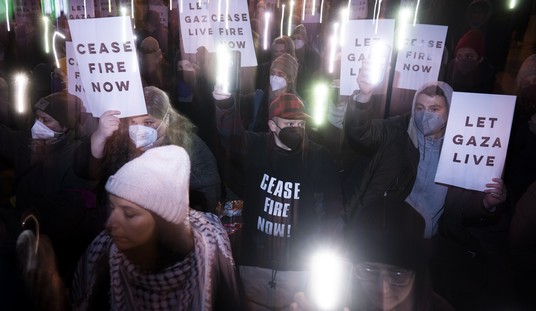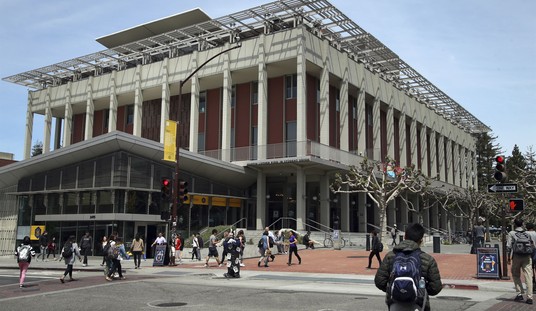No one has ever seen a presidential cycle quite like this one — and not just in regard to the Republican Party. Republicans nominated an amateurish loose cannon, and Democrats nominated someone under FBI investigation for potentially criminal behavior. At times, it seems like a soap opera, or perhaps a season of WWE. Across the political spectrum, though, the entire discourse of debate has grown more intensely vulgar and personal, while policy and track records — traditional measures by which support is gained or lost — have been all but forgotten.
In my column today at The Week, I argue that this reminds me of a (mostly) inexplicably popular and enduring pop-cultural phenomenon from two decades ago … and I’m not talking about the Clintons:
Sixteen years ago, MTV launched a television series called Jackass. It featured ill-advised stunts, obnoxious but funny practical jokes, and generally rude behavior aimed at entertaining a largely male audience ravenous for ridicule. Sound familiar?
Fourteen years after the show was taken off the air, we may finally be seeing a sequel: Jackass, the Political Cycle.
It’s not all from Donald Trump either, although he’s certainly setting the tone. Fellow billionaire Mark Cuban, who hinted earlier that he might be amenable to accepting a running-mate bid from either Trump or Hillary Clinton, endorsed the Democratic nominee this weekend when no such offer was forthcoming. In doing so, though, the Dallas Mavericks owner called Trump a “jagoff” during his speech at a Clinton appearance in Pittsburgh, using an insult common in western Pennsylvania slang. “Jagoff,” Salena Zito helpfully explains, descends to us from Scots-Irish immigrants from almost 400 years ago to describe an annoying person.
The media isn’t doing much better. Fareed Zakaria described Donald Trump as a “bullshit artist” on air during CNN’s Situation Room on Monday to respond to the Republican nominee’s shifting stances on Crimea. HBO’s John Oliver descended further in wit by referring to Trump as a “f—ing asshole” while criticizing Trump for his attacks on Khizr and Ghazala Khan. The New York Post went the full New York Post over the weekend, finding and publishing two-decade-old modeling photographs of Melania Trump in the nude, including on its front page, with as little pixelation as necessary to avoid a brown-paper wrapper for newsstands.
The media has focused their attention on this phenomenon almost entirely in the context of Trump and his campaign, but that’s far too narrow — and lets way too many people off the hook. Interestingly enough, progressive publication The Nation agrees. They ran an editorial a week ago rebuking its progressive allies for contributing to the erosion of the debate, accusing liberal pundits of “neo-McCarthyism” in some of their attacks on Trump. They managed to get it a shot at the dreaded neocons too, but that’s a tertiary target at best:
n their zeal to prevent Donald Trump from becoming president—a goal we share—representative voices of the liberal establishment have joined with the forces of neoconservatism to engage in what can only be described as McCarthyist rhetoric. This magazine, which has a long and proud history of standing up to the worst excesses of McCarthyism, repudiates this unwelcome echo of the past. …
While Trump himself has hardly been damaged by today’s revival of McCarthyism, the same cannot be said for our national debate. Over the past month alone, establishment voices likeFranklin Foer, Paul Krugman, Jeffrey Goldberg,Josh Marshall, and Jonathan Chait, among others, have Kremlin-baited Trump in lieu of reasoned argument and factual critique. On July 21, The Atlantic’s Goldberg informed readers that “The Republican nominee for president, Donald J. Trump, has chosen this week to unmask himself as a de facto agent of Russian President Vladimir Putin.” Krugman followed this up on July 22 by asking in The New York Times: “If elected, would Donald Trump be Vladimir Putin’s man in the White House?” Krugman then answered his own baseless question: “Mr. Trump would, in office, actually follow a pro-Putin foreign policy, at the expense of America’s allies and her own self-interest.”
The idea that Trump is some kind of Manchurian candidate first took root thanks to a mistranslation of a remark by Putin, which was misconstrued as high praise for Trump by the media—and by Trump himself. To be sure, the GOP candidate has suggested that he may pursue a policy of détente with Russia. He also, in our view wisely, threw out a reckless plank in the Republican platform that pledged to further arm Kiev. But Trump is only following the lead of the current administration. Should we assert seditious links between President Obama’s policy and the Kremlin?
Cheap demagoguery is hardly the exclusive province of Trump, in other words. It’s a fever that has always been present in national elections, but seems to be raging out of control in this cycle. Who’s to blame for that? Donald Trump? Hillary Clinton? The media? Instapundit’s Glenn Reynolds argues all of the above, but fixes blame where it ultimately belongs in a constitutional republic:
We’re moving into a general election with two very unpopular candidates at the top of the tickets: Hillary Clinton and Donald Trump. Substantial majorities of Americans dislike them both. Gallup last week found them with precisely equal, and awful, approval ratings: 37% favorable, 58% unfavorable. Each says the other is a corrupt tool. They’re both probably right.
How did we get to this situation? It boils down to failure at every level, from the political class, to the media, to the voters themselves. The consequences, I’m afraid, may turn out to be severe. …
And, of course, voters are to blame, too. One of the flaws of democracy is something called “rational ignorance.” Voters know that their individual vote isn’t likely to make a difference, so it’s rational for them not to put a lot of effort into informing themselves. Instead, politics is more like sports, with people cheering on a team or an idol regardless of real-world issues. Tyler Cowen writes that much of American politics is about which groups will rise in status over others, rather than policy per se. An electorate that views things this way is not likely to make political decisions that benefit the nation as a whole.
In a Jackass political cycle, it shouldn’t surprise us that the biggest jackasses rise to the top of the heap. The question now is which jackass is the worst — and the demolition of Libya into a failed-state haven for radical Islamist enemies of the US and the corruption of the State Department by one of them makes that choice fairly clear, even if it is distasteful nonetheless.








Join the conversation as a VIP Member